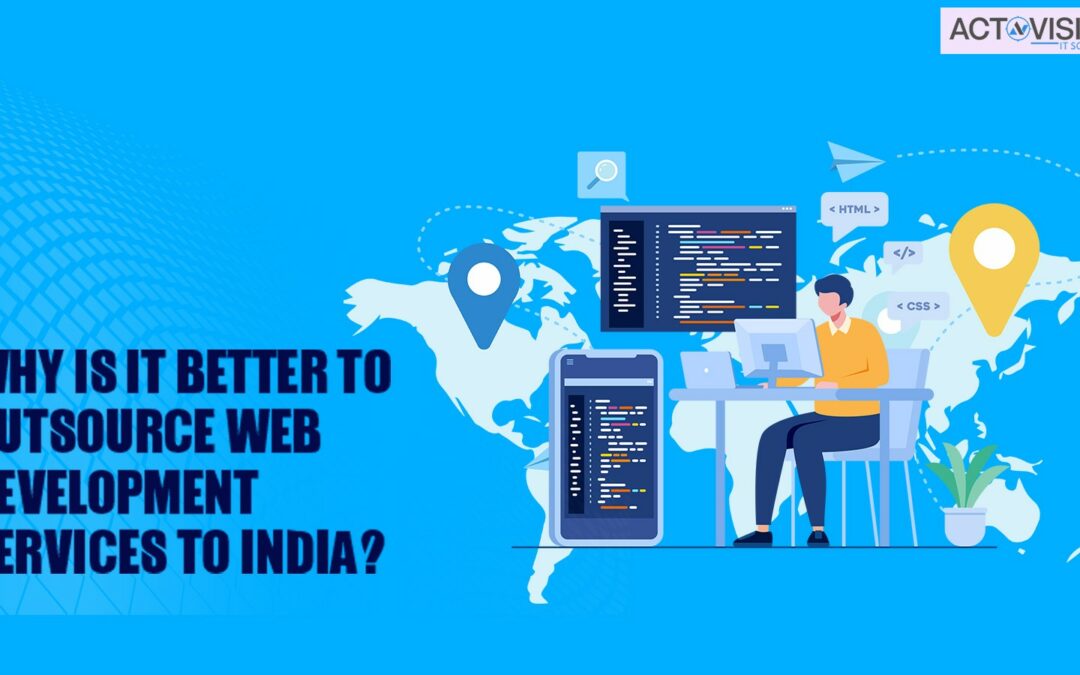
by actovision | Nov 11, 2021 | Uncategorized
From large enterprises to small and medium scale businesses – all are leaning towards building a web app to enable the target audience to access their online destination effortlessly. If you are looking to engage web application development services anytime soon, this blog is a must-read. Here, we will explore some of the crucial features your web app should have. We will divide the blog into two aspects: technical components and features. Let’s check them out.
Technical Components of a Web App
Service Worker
The service worker facilitates offline work mode and background syncing. It paves way for application shell or interface caching so that the app instantly loads during repeat visits. Relevant dynamic content like images, shopping cart, chat history, checkout, etc. can be loaded later when the connection is restored.
Web App Manifest
A web app manifest (a JSON file) gives the app a mobile app like interface appearance. With it, you can control the way your web application will be displayed to the visitor. Usually, the display features a full-screen mode without a visible URL bar. The file is a prime location for the web application’s metadata. You can also define a splash screen along with a theme colour for the address bar.
Transport Layer Security or TLS
Web apps leverage TLS or Transport Layer Security protocols. It is the standard of robust and secure data exchange between two apps. The integrity of the data demands installing an SSL certificate on the server and serving websites via HTTPS.
Must-Have Features in a Web App
1. Serverless Cloud Architecture
Serverless technology is bringing a revolution in the realm of software development. This enables accessing data with minimal or no hardware constraints. It has ample benefits over traditional on-premise systems. Therefore, an increasing number of businesses are using cloud technologies to build web applications.
Adopting a cloud-based architecture gives businesses a break from the complexity of setting up or dealing with complex servers. Further, it offers adequate security, flexibility, and scalability to a web app.
2. Mobile-First Interface
Gone are the days of the traditional belief that people access a website from a desktop or laptop. In the first quarter of 2021, mobile devices generated 54.8% of global website traffic (source: Statista).
A web app must be ready to welcome people coming from smartphones or tablets. A responsive UI design is no more a luxury but a necessity. With the rise of IoT, a web app can be accessed from other devices like wearables, refrigerators, or smart TVs. A dynamic web design built with a mobile-first interface is lightweight and can fit in any screen size.
3. Push Notification
Push notification is no more exclusive to mobile apps. This is great news for businesses as they need not launch a mobile app or wait for people to install it into the phone. The users can get push notifications from web apps as well. These greatly enhance user engagement.
Also, the process is fast and simple. With a one-click-opt-in feature, the users can enable push notifications. These seem just like from an installed mobile app and do not require the browser to run in the background.
4. Chat
These days, integrating a live chat or chatbot has become essential. People do not often call a business or drop an email. Should they fail to find something on the web app, they prefer to ask via the integrated chat feature.
Remember, if their queries remain unanswered, they may not interact with your business and simply bounce.
To avoid this, it’s better to integrate a chat feature on your web app. You can even integrate your business WhatsApp (or any other messenger that you use) so that people can instantly contact you.
5. Search Engine Optimization
Without search engine friendliness, your website will not be visible to a wider audience and it will affect the number of traffic you receive. If you don’t want that, ensure that your web app is optimized for the search engines. Here is a detailed guide to an effective SEO strategy.
- The site navigation should be logical and enable the search engines to crawl and index.
- Use schema.org metadata that is relevant to the web page content. It will enhance your appearance on the SERP (Search Engine Result Page).
- Place scripts outside HTML document. If JavaScript and CSS are not externalized, they can add multiple additional lines of code in the HYML document which will make crawling slower.
- The web pages should not use fragmented identifiers since Google will simply ignore them.
- Block pages that you don’t want to be crawled or indexed.
- Implementing image alt attribute is a must.
- Provide canonical tags while serving content from different sources so as to avoid duplication.
- Follow the W3C standard that focuses on writing semantic markup. This is great for SEO.
You can also engage SEO services after the web app is built in order to enhance its ranking on the SERP.

by actovision | Nov 11, 2021 | Web Development
In the fast-paced world of the internet where millions of websites compete with each other to reach out to their target audience, it is primarily the quality of your website (along with other factors such as ranking on SERPs, etc) that helps your business to stay relevant and competitive. Further, the quality of your website ultimately determines the Customer Experience (CX), the crucial factor that helps your website to garner customer traffic repeatedly. According to Forbes, companies that offer superior customer experiences outperform their rivals by 80%.
Over the years, India has emerged as one of the most mature markets globally to outsource business processes including IT. According to a survey conducted by CBRE, a leading real estate consulting firm, more than 75 percent of multinational companies consider India as their preferred outsourcing market. Their confidence is based on India’s buoyant economy, growing talent pool, regulatory reforms, and cost advantage, among others. Let us discuss these in detail:
Cost advantage: In terms of the currency exchange rate, the currencies of the USA, Canada, European countries, Australia, and the Middle East (dollar, euro, pound-sterling, dirham, etc) have a much higher value than the Indian Rupee. It means if you happen to be from the above-mentioned countries and want to outsource your web development job to an Indian company, the cost would be significantly less. So, when it comes to choosing quality and savings, outsourcing the job to India would be in your best interest.
Quality: The attribute we just referred to in the above segment. A bad-quality website can mean disaster for your business. Forget getting traffic, you may end up with a bruised brand image and tattered reputation. In a world of growing incidences of cybercrime and shifting customer preferences, the presence of bugs, vulnerabilities, and glitches in your website can hit your business hard. This is where outsourcing the job to an experienced web development company in India matters. Thanks to their experience in developing websites for multiple domains and expertise in the latest web development trends and technologies, India-based developers can build a quality website for your business. In doing so, they consider factors such as business objectives, latest web design trends, responsiveness, usability, functionality, and security, among others. No wonder business enterprises from around the world continue to outsource their web development jobs to Indian developers.
Top-quality skill sets: When it comes to hiring developers offering web development services, clients often find developers not skilled in multiple technology stacks. However, this is not the case with experienced Indian web development companies as they have developers skilled in multiple web technologies. These include technologies such as Node JS, Angular, React, PHP, WordPress, Drupal, Magento, Shopify, Joomla, and others. So, an Indian software company can build your website on a platform that is most suitable to your budget and business objective.
Better time utilization: Due to the differences in time zone, you can utilize the services of an Indian website development company 24 x 7 including during non-working hours. Also, if your business remains open between say, 9 to 6, the web development companies in India can work round the clock. This can help improve the productivity and efficiency of your project.
Saving on infrastructure: By outsourcing the job to an Indian software company you can save money by not setting up an in-house infrastructure. Instead, the outsourced company in India takes care of everything in terms of making investments in software resources, training employees, and hardware infrastructure.
A talent pool of resources: Indian educational institutions churn out highly skilled human resources in various domains including Information Technology. India has a talent pool of 15 million skilled programmers categorized into areas such as web development, software development, and mobile app development, among others. Also, experienced web development companies in India offer customized web solutions based on your business needs. They have the right blend of talent pool comprising web developers, business analysts, quality analysts, designers, digital marketing experts, and project managers. So, by outsourcing your web development job to an experienced Indian software company you can be assured of high-quality work within agreed timelines.
Effective communication: Thanks to the availability of state-of-the-art infrastructure comprising high data bandwidth spread across cities, people working with Indian software companies can easily communicate (and exchange data) with their counterparts present in any part of the world. This means you can keep a track of the progress of your work in real-time on a daily basis and receive work-related documents and to-do lists as and when needed. Besides, India has arguably the largest English-speaking population in the world. This means you can easily communicate with the developers (and other stakeholders) on any business-related aspect.
Regulatory reforms: India is a signatory to most of the international covenants on protecting data privacy. Besides, India has reformed its laws to facilitate the setting up of SEZs (Special Economic Zones) where IT companies work for businesses based in the USA and other countries. This means you work with genuine IT companies with expertise and experience rather than deal with fly-by-night operators.


